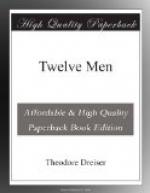Some Saturday afternoons or Sundays, if he came to me or I to him in time, we indulged in long idle rambles, anywhere, either going first by streetcar, boat or train somewhere and then walking, or, if the mood was not so, just walking on and on somewhere and talking. On such occasions Peter was at his best and I could have listened forever, quite as the disciples of Plato and Aristotle must have to them, to his discourses on life, his broad and broadening conceptions of Nature—her cruelty, beauty, mystery. Once, far out somewhere beyond Camden, we were idling about an inlet where were boats and some fishermen and a trestle which crossed it. Just as we were crossing it some men in a boat below discovered the body of a possible suicide, in the water, days old and discolored, but still intact and with the clothes of a man of at least middle-class means. I was for leaving, being made a little sick by the mere sight. Not so Peter. He was for joining in the effort which brought the body to shore, and in a moment was back with the small group of watermen, speculating and arguing as to the condition and character of the dead man, making himself really one of the group. Finally he was urging the men to search the pockets while some one went for the police. But more than anything, with a hard and yet in its way humane realism which put any courage of mine in that direction to the blush, he was all for meditating on the state and nature of man, his chemical components—chlorine, sulphuric acid, phosphoric acid, potassium, sodium, calcium, magnesium, oxygen—and speculating as to which particular chemicals in combination gave the strange metallic blues, greens, yellows and browns to the decaying flesh! He had a great stomach for life. The fact that insects were at work shocked him not at all. He speculated as to these, their duties and functions! He asserted boldly that man was merely a chemical formula at best, that something much wiser than he had prepared him, for some not very brilliant purpose of his or its own perhaps, and that he or it, whoever or whatever he or it was, was neither good nor bad, as we imagined such things, but both. He at once went off into the mysteries—where, when with me at least, he seemed to prefer to dwell—talked of the divinations of the Chaldeans, how they studied the positions of the stars and the entrails of dead animals before going to war, talked of the horrible fetiches of the Africans, the tricks and speculations of the priests of Greek and Roman temples, finally telling me the story of the ambitious eel-seller who anchored the dead horse in the stream in order to have plenty of eels every morning for market. I revolted. I declared he was sickening.
“My boy,” he assured me, “you are too thin-skinned. You can’t take life that way. It’s all good to me, whatever happens. We’re here. We’re not running it. Why be afraid to look at it? The chemistry of a man’s body isn’t any worse than the chemistry of anything else, and we’re eating the dead things we’ve killed all the time. A little more or a little less in any direction—what difference?”




